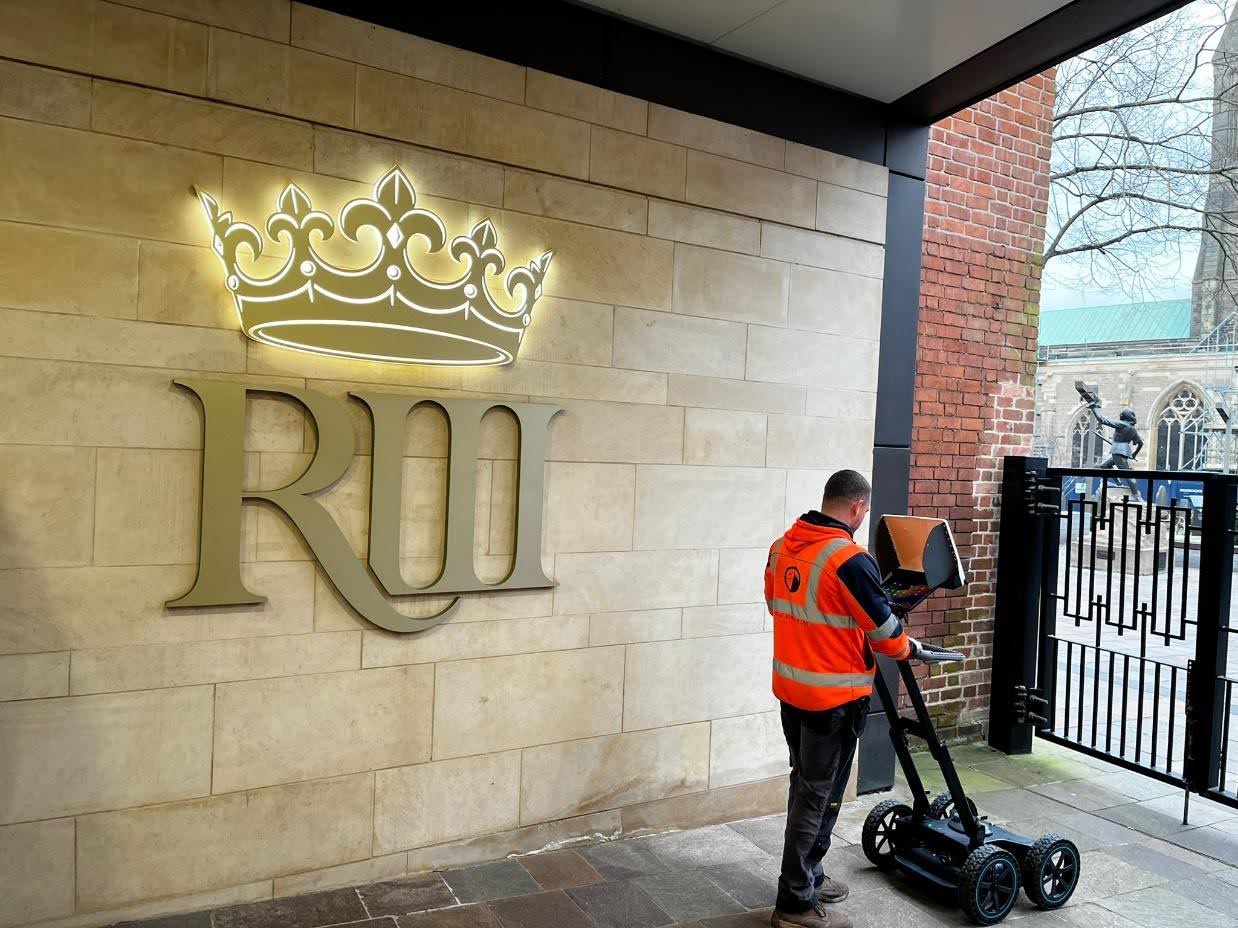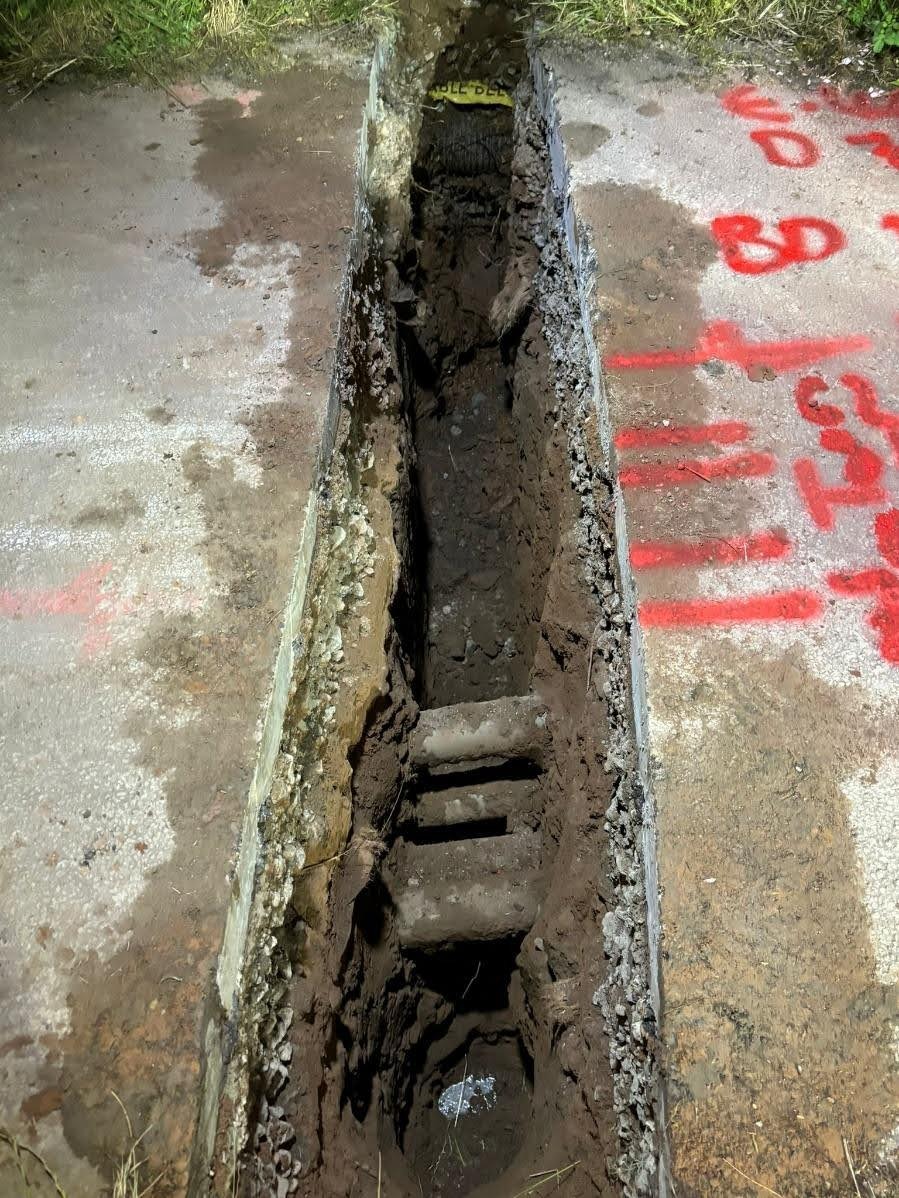A borehole clearance survey also known as a utility or service clearance survey is a type of geological survey that checks an area for any potential problems before it is excavated or drilled.
These surveys use underground utility detection including Electromagnetic Locating (EML) and Ground Penetrating Radar (GPR) and equipment to create a picture of the ground below and identify any hazards or problems before drilling or excavation starts such as utilities like electricity, gas or water lines.
Here are some key aspects of borehole clearance:
- Regulatory Compliance: Borehole drilling is subject to regulations and guidelines set up by local, regional, or nation authorities. These regulations are in place to ensure the sustainable and responsible extraction of groundwater and to protect water resources. Borehole clearance involves understanding and adhering to the specific regulatory requirements related to drilling, construction, and water extraction.
- Permitting and Licensing: Depending on the jurisdiction, obtaining permits or licenses may be required before drilling a borehole. This may involve submitting applications, providing relevant documentation, and paying associated fees. The permit or license ensures that the drilling operation meets specific technical standards, environmental considerations, and safety requirements.
- Environmental Considerations: Borehole clearance may involve assessing potential environmental impacts associated with drilling activities. This includes evaluating the potential risks to groundwater quality, nearby ecosystems, and surrounding infrastructure. Environmental impact assessments or studies may be required, and mitigation measures may need to be implemented to minimise any adverse effects.
- Water Rights and Ownership: In some jursiditcions, obtaining borehole clearance may also involve demonstrating the legal rights to extract and use the groundwater. This may require proving ownership of the land where the borehole will be located or obtaining water rights or permits that grant authority to access and use the ground water resources.
- Consultation and Notification: Depending on the jurisdiction and local reguations, it may be necessary to notify or consult with relevant stakeholders, such as neighbouring landowners, community representatives, or water authorities. This ensures transparency, addresses potential concerns, and allows for the exchange of information related to the drilling operation.
- Inspections and Compliance Monitoring: Once a borehole is drilled, authorities may conduct inspections or monitoring visits to ensure compliance with regulations, permit conditions, and technical standards. These inspections help verify that the borehole construction meets the required specifications, and that the extraction of groundwater is being carried out responsibly.
Borehole clearance is essential to ensure that borehole drilling activities are conducted in a regulated and responsible manner. It helps protect water resources, prevents adverse environmental impacts, and ensure the safety and sustainability of groundwater extraction. The specific requirements for obtaining borehole clearance may vary depending on the jurisdiction and local regulations governing water resources management and drilling activities.

Why is a borehole clearance needed?
A borehole clearance is needed for several reasons:
- Feasibility Assessment: Before drilling a borehole, a clearance is necessary to asess the feasability of the proposed location. This involves evaluating geological conditions, hydrological considerations, and other factors to determine if the site is suitable for drilling and if it is likely to yield a sufficient quantity and quality of water.
- Regulatory Compliance: Borehole clearnce ensures compliance with regulatory requirements and permits necessary for drilling operations. Many jurisdictions have specific regulations governing the drilling and use of boreholes to protect water resources and ensure responsible groundwater extraction. Obtaining the required permits and adhering to regulations is essential to avoid legal issues and penalties.
- Environmental Impact Assessment: A clearance survey includes an assessment of potential environmental impacts associated with drilling activities. This evaluation helps identify and mitigate any adverse effects on ecosystems, surface waterbodies, and other environmental resources. It ensures that drilling operations are conducted in an environmentally responsible manner.
- Water Resource Management: Borehole clearances play a crucial role in water resource management. Assessing the feasibility and impact of borehole drilling helps ensure the sustainable use of groundwater resources. By evaluating factors such as groundwater availability, recharge rates, and potential impacts on existing water sources, clearances help prevent overexploitation and ensure the long-term viability of water supplies.
- Risk Mitigation: A clearance survey helps identify potential risks and challenges associated with borehole drilling. This includes assessing geological hazards, water quality concerns, and risks to infrastructure and neighbouring properties. By identifying an addressing these risks upfront, proper measures can be taken to mitigate them and ensure the safety of the drilling operation.
- Planning and Cost Considerations: Borehole clearances assist in effective planning and budgeting for drilling projects. They provide evaluable information about the site, including the depth, diameter, and construction requirements of the borehole. This helps in deterring the appropriate equipment, materials, and resources needed for the drilling operation, ensuring efficient project management and cost control.
Overall, a borehole clearance is essential to make informed decisions, ensure regulatory compliance, protect the environment, and promote sustainable water resource management. It provides a comprehensive assessment of the proposed drilling site and helps minimise risks, maximise4 water yield, and maintain the long-term viability of groundwater sources.
A borehole clearance is a survey or clearance performed before undertaking any intrusive digging or borehole drilling. This is to ensure that no obstacles or services are present in the dig area.
Borehole clearance surveys are performed by expert surveyors to ensure safety when drilling or digging borehole areas. This is because like many other surveys they are accompanied by risks.
The borehole area will be clearly marked out by the site surveyor. If a planned a borehole location appears to be in the area of a buried utility, an alternative location will be suggested and cleared by the surveyor.
Utility records should always be available prior to any clearance works taking place. Conducting a borehole clearance survey dramatically reduces the risk of a cable strike during the digging process.
DIFFERENT SURVEYS PERFORMED TO CLEAR ALL TYPES OF BOREHOLES
- Commercial borehole clearance
- Water well borehole clearance
- Domestic borehole clearances
- Piling clearances
- Agricultural clearances
- Ground structure clearance
- Environmental window sampling
The Process Involved in Borehole/Service Clearance Surveys
Borehole clearance surveys are a five-step process:
Step one:
The borehole clearance specialist collects the location information from the client. Accuracy is crucial here.
Step two:
The service clearance specialist checks the utility record for the location for evidence of water, gas, sewer, or electric pipes and cables.
Step three:
Service clearance specialists perform the survey onsite using Subsurface hazard mapping equipment like Electromagnetic Locating (EML) and GPR surveys.
Step four:
The borehole clearance surveyor maps any underground utilities on the site with biodegradable paint. They also add the coordinates of these locations to a map and provide actionable reports for the client to use.
The Applications Of Borehole / Service Clearance Surveys:
If you are wondering when or where a borehole survey or a service clearance survey might be needed you are in the right place. Indeed, below you will find some specific situations in which service clearance surveys are required.
Geotechnical investigations
Geotechnical investigations are examinations that are done to find information about the rock and soil that is present below the surface. These types of investigations are particularly important when building projects underground such as parking areas, or underground utilities. These types of investigations are vital for many projects as they provide data on what to expect and prepare for when developing and excavating the designated area. Borehole clearance surveys can be an essential part of geotechnical investigations because they provide valuable data about the subsurface of the area in question.
Assessing Underground Conditions
Service clearance surveys are particularly good at finding hazards beneath the surface including solid hazards like rocks, and boulders, and hazards of absence like voids. Service clearance surveys can also be used to locate the presence of any materials underground that have been contaminated, and that would pose a threat to the safety of those working on the project, or those using it once it was built.
Construction projects (piling, foundations)
Foundations and pilling need to be inserted deep into the ground and must stand strong to support the structures that are built around and on top of them. Unfortunately, it’s usually impossible to see what the ground is from the surface. This means that you could get almost to the right level of excavation for your foundations only to discover a rock shelf that is impossible to budge. By committing to a borehole clearance survey beforehand, you can avoid this and avoid all the wasted resources such as time, and money that unsuccessful excavations cause.
Environmental site assessments
Clearance surveys are helpful when it comes to environmental site assessments because they can include an evaluation of any environmental impact drilling in a location may have. By using borehole clearance services in environmental site assessments its possible to increase safe drilling practices, allowing those doing the work to minimize or avoid any negative impact on the surrounding ecosystems.
Utility installations
Those tasked with the job of installing new utilities will often discover previous utility lines and pipes in the areas in which they are tasked to dig. Of course, the idea is to avoid these and getting a service clearance survey done before the digging starts will help you know which bits are safe to excavate and which are best avoided.

Choose Castle Surveys Ltd For All Your Borehole and Service Clearance Survey Needs
There are so many reasons to choose Castle Surveys Ltd for all your borehole and service clearance survey needs.
Expert
The first is that our team of dedicated surveyors are experts at service clearance surveys. They have a proven track record of delivering surveys on time, and on budget, and making sure customers are delighted with the service we offer.
Accurate
Another reason to choose Castle Surveys Ltd for your borehole clearance survey is that we understand just how important reliable and accurate data is to our clients. That is why we use only the best state-of-the-art equipment and train our surveyors to the highest possible standard, ensuring you get accurate usable results,
Advanced Equipment
Here at Castle Surveys Ltd, we only ever use the very latest technology and techniques to ensure our surveying data is accurate, reliable, and up-to-date.
We also minimise any disruption to your site by using non-invasive technology. This helps us to find buried utilities and obstructions within the area designed for the survey before work begins. Saving you lots of time and effort in the process.
Helpful
The expert team at Castle Surveys Ltd understand that it is not only the service that we perform that is important to our customers, but how we perform it as well. That is why you’ll find that our knowledgeable team is always happy to help you with any questions or queries you have during the survey process.
National and international coverage with efficient delivery.
Last of all, Castle Surveys Ltd are pleased to be able to offer borehole clearance surveys across the UK, and internationally. We also know that every minute that tools are downed on site is costing you money, that is why pride ourselves on efficient delivery every time, keeping your costs low and exceeding your expectations.
